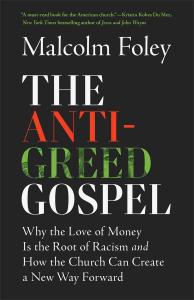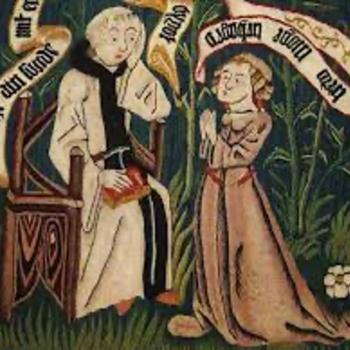“And some things that should not have been forgotten were lost.” This voiceover from Cate Blanchett’s Galadriel helps alert us to the problems facing Middle Earth at the beginning of Fellowship of the Ring. It rhymes in a Twainian style with what war correspondent Gloria Emerson wrote about the United States in Vietnam: “We have always been a people who dropped the past and then could not remember where it had been put.” The problem in our own and the fictional Middle Earth is so often forgetting. We assuage our consciences through not remembering long enough that “history passes into legend.” We abdicate our responsibility to ourselves and our society. I want to ask three questions related to the forgetting of history and its traumas. To guide us through answers, I will draw on Historian, Pastor, and fellow-writer at the Bench, Malcolm Foley’s newly published book The Anti-Greed Gospel: Why the Love of Money is the Root of Racism and How the Church Can Create a New Way Forward.
Before I ask questions and attempt to answer them, I want to be honest with whoever happens to read this. Malcolm’s book and the amnesiac church it describes relates to my own story in a few ways. I’ve written here about my grandmother’s story of being an Indian boarding school survivor. In another branch of my family, a great-grandfather would have been ten-years old and for all I know might have attended the lynching of Mary Turner and her unborn child (15-16). Regardless, I grew up as a white presenting man in the town which decided to kill her. I’m going to avoid many of the more horrific bits of history in what I write here. However, I believe it’s important for the reader to recognize that history has a cost—indeed it has cost some historians their mental health and even their lives—and that it is a cost we as a society and as the church must pay. As Maya Angelou put it in the wonderful poem “On the Pulse of the Morning,” “History, despite its wrenching pain, cannot be unlived, but if faced with courage, need not be lived again.”
The first question I want to examine is that of historical amnesia. Say a people forgot their past in order to avoid being hurt or to ensure they might finish a task. How would one go about awakening them to that forgotten story? A story they chose to forget. Chesterton famously says only a living thing can fight upstream against the current, while dead things go floating by. It seems worth noting that sleeping things also would float by anyone fight the same current. Malcolm’s book is clearly a heart cry and sermon from a preacher, and I therefore feel no qualms in noting the difference between one who must be told “Awake thou that sleepest, and arise from the dead, and Christ shall give thee light.” (Eph 5:14) and those who “wait for the Lord more than watchmen wait for the morning, more than watchmen wait for the morning.” (Psalm 130:6) The problem is that Dr. Foley seems to be writing to both groups. How does one write to both audiences at once: the awake, waiting to see a solution, and those blissfully asleep, unaware the problem exists and persists?
Throughout the volume, the entire wealth of the Christian tradition is brought to bear against the deadly cycle of power, violence, money, and exploitation that we created and which we have never controlled. Dr. Foley is as comfortable quoting Bavinck and Basil as he is Malcolm X and Marx, and the former are quite as caustic in their attacks on greed and its children violence and racialization. Malcolm deftly side-steps potential roadblocks inviting those who disagree with him into a story they may have missed. Central to this is a remarkable answer to a string of questions. Greed works. Sin works. I once had a therapist tell me that in many situations a user takes their drug of choice for simply that reason. It works. It may ultimately destroy them, but they are unable to be concerned for the future and just need to make it through the moment. Drawing a parallel here to the one ring seems a bit on the nose, but works for a reason. We are addicted to that which we believe will give us power and which will destroy us—even as it gives us what it promised. Think of how Tolkien describes Gandalf if he had taken the ring. “It was part of the essential deceit of the Ring to fill minds with imaginations of supreme power. Gandalf as Ring-Lord would have been far worse than Sauron. He would have remained ‘righteous’, but self-righteous. He would have continued to rule and order things for ‘good’, and the benefit of his subjects according to his wisdom (which was and would have remained great).” This is precisely what happens to those who have attempted to wield the power of whiteness and racialization. Take the horrifying and normal, for their time, works of Atticus Haygood. Haygood, a Methodist minister argued for all intents and purposes “If Black people would just shape up, mobs would stop torturing and burning them alive.” (76)
Perhaps following logically from this is the question of how historians should talk about the theological term or category of sin. Francis Spufford helpfully defines it in his book Unapologetic as the overwhelming human propensity to f**k things up. Dr. Foley describes this evil in all its power, almost to the point of overwhelming the reader. The terrors of racial capitalism take two demonic forms: tendrils and talons. Talons are the physical and structural violence committed against racialized minorities while tendrils represent the mental and imaginative repression of these same groups. Lynching accomplished both ends. The actual event physically destroyed the individual(s) being tortured and murdered, ostensibly kept others in their place through fear of violence, and kept racialized minorities in a constant state of terror. Any slight perceived or real could be the basis for a lynching: looking at a white woman, complaining when underpaid, even complaining about your husband’s murder as in the case of Mary Turner. This is the section where I have the most questions about how Dr. Foley and his editor went about the book. I am constantly wrestling in my own work with the question of violence and evil. How do we as historians balance telling the sheer brutality of the past with falling into trauma porn? For instance, I know that very few in the South take seriously what an industry Lynching was. Postcards and more grisly souvenirs were collected. I still struggle with how to make sense of it myself. I find generally that the artists have found a way and perhaps we can follow.
Langston Hughes was provoked by these horrors to write his “Song or a Dark Girl” with its allusions to a solidarity between Christ and the lynching victim:
Way Down South in Dixie
(Break the heart of me)
They hung my black young lover
To a cross roads tree.
Way Down South in Dixie
(Bruised body high in air)
I asked the white Lord Jesus
What was the use of prayer.
Way Down South in Dixie
(Break the heart of me)
Love is a naked shadow
On a gnarled and naked tree.
I believe this offers a hint as to why Malcolm said earlier this year at an academic conference, “It is properly beneath the Christian to fear anything of this world.” Both these arguments point us towards the hope he offers for a way forward in the second half of the volume.

Finally, we are confronted with the question historians dread the most. Can the past help us make sense of a way forward? Cornel West put it this way “Everyday is an opportunity to step out of cowardice and choose courage as a way forward.” Using Ida B. Wells as a case study, Dr. Foley offers us a way out of our cowardice. Every vice of course must be replaced with virtues. In place of greed, violence, and complacency, we are offered relentlessness, creativity, and a holy fury. In her youth, Wells believed like many Americans that lynchings were a response to injustice. The legal system failed and so the community stepped in. Then, someone close to her was murdered in cold blood because of a business feud amidst the Memphis race massacre in 1892. Suddenly, Wells began to see lynching differently, as a tool of social and economic repression. Wells would go on to publish brilliant investigative reports undermining the claims of those who perpetrated lynchings and encouragement to African Americans to flee these communities. In the end, she was correct. Dr Foley ably summarizes a historiography which demonstrates why lynchings ended. There was no come to Jesus moment. Using corkscrews on human beings did not go out of style. “As Ida says, the the white man’s dollar is his god and that idol tempts each of us now.” (88) Instead, the great migration of African Americans fleeing fear of the lynch mob economically crippled the South and other communities who committed these crimes. Wells was constantly under threat of death from white supremacists who hated her. She died, from liver disease, before she saw the end of lynching. Here too is a lesson to be learned.
Dr. Foley’s suggestions for moving forward are equally brilliant, and I have only scratched the surface of how he uses history. I cannot recommend buying this slim volume enough.
I’ve decided it doesn’t matter whether my great-grandfather was in the crowd when Mary Turner and her child were murdered. Either way I must take responsibility for my country, for what my ancestors did and refused to do. As Malcolm so eloquently puts it, the only way forward is together—in communities which refuse to accept the terms of reality we have been given. This is precisely how the West responds to the loss of memory Galadriel laments in Lord of the Rings. It is never an individual and always a community that resists evil and ultimately destroys the ring. The council of Elrond explains the whole history of what has been forgotten by most. Those with authority take responsibility. Aragorn, for his ancestor Isildur’s failure to the destroy the ring. Saying, “There are some things that it is better to begin than to refuse, even though the end may be dark.” Boromir takes responsibility for his attack on Frodo, to the point of dying to protect Merry and Pippin. Afterall, as Malcolm puts it, “the role of the Christian is to proclaim with their words and with their life that the world has already been changed.” (164) Put another way, all this might be best summed up by James Baldwin: “Not everything is lost. Responsibility cannot be lost, it can only be abdicated. If one refuses abdication, one begins again.” Will the American Church take responsibility for our actions and inaction, our part in the destructive cycle? Only if we can face our history together is there any way forward.














